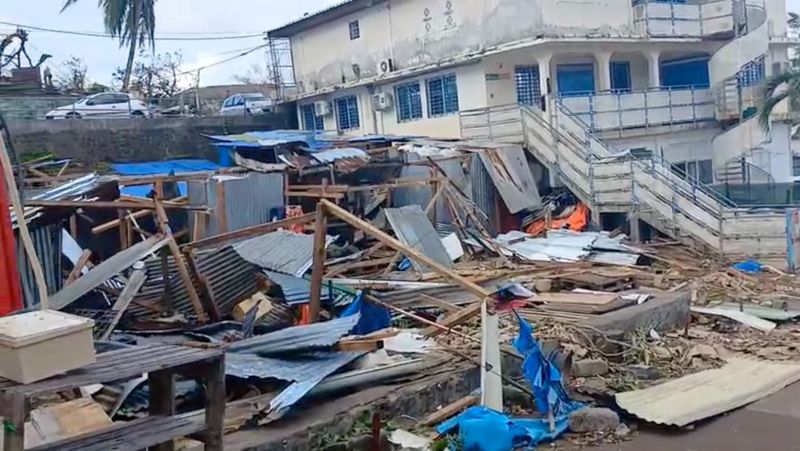Useful information
Prime News delivers timely, accurate news and insights on global events, politics, business, and technology
Useful information
Prime News delivers timely, accurate news and insights on global events, politics, business, and technology

By Diana Mandia and Aaron Ross
(Reuters) – Emergency workers raced on Monday to find survivors and restore services in the French overseas territory of Mayotte, where hundreds or even thousands are feared dead in the worst cyclone to hit the Indian Ocean islands. in almost a century.
Parts of the islands, which were hit by Cyclone Chido over the weekend with winds of more than 200 kilometers per hour (124 mph), remained inaccessible to rescuers on Monday, French civil security spokesman Alexandre Jouassard said.
“The next few minutes and hours are very important,” he told France 2 TV. “We are used to working in these conditions and, a few days later, we have pockets of survivors.”
French President Emmanuel Macron was due to hold an emergency meeting on Mayotte at 6:00 p.m. local time (17:00 GMT), French BFMTV reported.
The storm was the strongest to hit Mayotte in more than 90 years, French weather service Méteo France said.
Mayotte has a population of approximately 321,000 and is made up of two main islands in an area approximately twice the size of Washington DC.
The remains of hundreds of makeshift houses were scattered across hillsides, coconut trees had crashed onto the roofs of buildings and hospital corridors were flooded, according to images from local media and the French gendarmerie.
“It was the wind, the wind was blowing, and I panicked, I screamed ‘We need help, we need help,’ I was screaming because I could see the end was coming for me,” said John Balloz, who lives in the capital, Mamoudzou. he told Reuters.
“Many houses and even cities are razed, especially in the slums, because only the roofs remain in the brick houses.”
TOTAL UNKNOWN TOLL
The full extent of casualties and damage on the island, which lies between Madagascar and Mozambique, remains unclear.
Mayotte Prefect François-Xavier Bieuville said at the weekend that deaths would likely number in the hundreds and possibly several thousand.
Jouassard said it would be difficult to quickly establish the number of victims, especially since some people had already buried their loved ones in accordance with Muslim tradition.
Images from Mayotte showed overturned boats, cars buried under rubble and people huddled under tables when the cyclone hit.
Located almost 8,000 kilometers (5,000 miles) from Paris, Mayotte is a major destination for undocumented migrants from nearby Comoros. It is significantly poorer than the rest of France (three in four people live below France’s national poverty rate) and has struggled with social unrest for decades.
Sea and air operations were underway to transport relief supplies and equipment, French authorities said late Sunday.
Authorities had established an air bridge between Mayotte and Reunion Island, another French overseas territory on the other side of Madagascar, said Sebastien Lecornu, French minister of the Armed Forces.
AIRPORT CLOSED
However, Mayotte’s main airport remained closed to civilian flights on Monday morning, said Jean-Paul Bosland, president of France’s national firefighters federation, and charities were scrambling to respond.
Julien Bousac, coordinator of the medical organization Médecins du Monde, said the organization had only managed to contact three of the 25 volunteers it works with.
Eric Coquerel, who heads the French parliament’s finance committee, said the destruction in Mayotte exposed a lack of preparedness for the consequences of climate change.
“Living conditions (in Mayotte) are completely unhealthy for many,” he told French broadcaster LCI. “It was obvious that… when a cyclone came… we would be in a situation.”
Mayotte’s large undocumented population is especially vulnerable to natural disasters, meteorologist Gael Musquet told BFMTV. “This undocumented population clearly had difficulty accessing shelter,” he said.

Extreme weather events have become more common around the world, in line with global warming. Poorer nations often say they are hardest hit by the environmental crisis even though they have historically emitted much less CO2 than richer countries.
After Mayotte, Chido made landfall in northern Mozambique with winds of 260 kilometers per hour and heavy rain, the United Nations Population Fund said on Day X. But it appears to have weakened considerably since reaching mainland Africa.